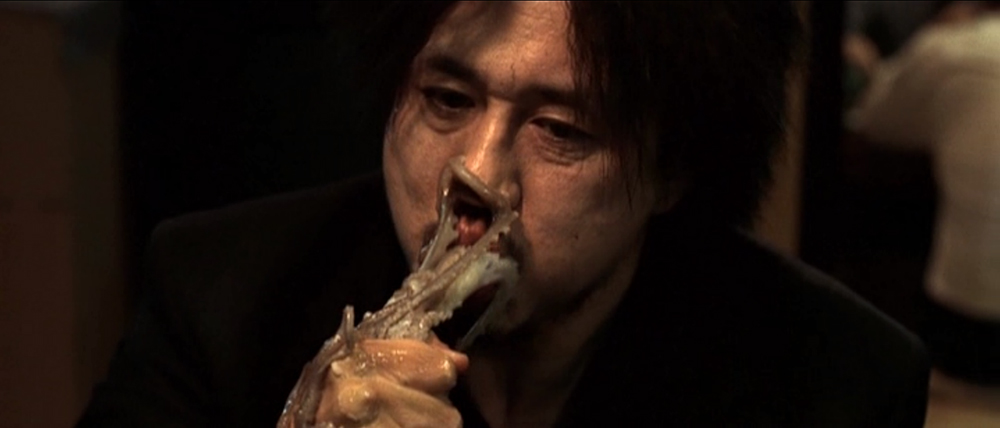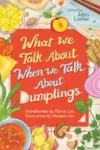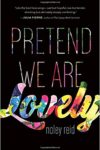
Seven people die every year from octopus-related accidents of the following kind: a careless gourmand will swallow a tentacle, suction cup intact, and choke to death, hand lodged halfway down his windpipe clawing for air. In Korea, it is a common practice to decapitate an octopus and chop its tentacles into bite-sized pieces, which wriggle and stick to slices of garlic, chopsticks, tongue, and throat. (See, for example, the classic scene in Park Chan-wook’s Oldboy.) If a diner, distracted by the sensation of a sucker clinging to teeth, swallows without chewing the live tissue into slime and sweet pulp, he might strangle.
My desire to become an unlikely statistic drove me to torture a living animal. Or at least to experience its death in the most intimate way possible: inside my mouth. I do not want to overstate the danger of eating live octopus. Self-strangulation does intensify the pleasure of an ordinary dinner. Many will dine, few will die. But there is a sadism inseparable from the experience of death drawing into view. Every mouthful risks choking while inflicting an unknowable measure of pain on the dismembered limbs of a living creature.

Jason Bell’s work has recently appeared in Guernica, Vice, The Brooklyn Quarterly, and Alimentum. He writes a monthly column for Full Stop about food and culture and lives in New Haven, CT, and St. Louis, MO.
Does an octopus feel pain? What about its amputated limbs? To rephrase Thomas Nagel’s thought experiment, what is it like to be the wriggling bit of octopus on a chopstick? These questions are central to David Foster Wallace’s famous essay on eating lobster, in which he argued eloquently against the practice of boiling the bugs alive. Yet when we consider the octopus, the problem of determining the exact dimensions of animal pain seems irrelevant. The ratio of masochism to sadism is so uneven and so dramatic, the experience of another creature’s pain so intimate to our own bodily life but so disproportionate to our own risk, that inflicting and witnessing pain ought to be reason enough to condemn the activity.
But after the appetizer, tentacles squirming in sesame oil and green onions, we ordered a hot pot with baby octopus: a flat pan piled with noodles, rice cakes, mushrooms, giant clams, abalone, mussels, squid, raw beef, boiling broth, and a whole live octopus climbing over the mound of seafood like a toddler learning to crawl, (eight) limbs flailing and striking out for firm ground. Instead, it struggled to get a tentacle-hold on the rim of the pan. My friend Julia, ladle in hand, gently pushed it deep into the soup to end its suffering.
For many years I dismissed Wallace’s argument on aesthetic grounds. I liked eating lobsters boiled alive and I almost never needed to do the boiling myself. After all, if we avoided every activity or commodity that entailed injury to other animals or people, even when we didn’t have to do the injuring ourselves, we’d be walking around naked and eating sunlight. But watching that octopus succumb to the broth, reading its spasms as analogous to the screams and contortions of a human body set afire, I saw the compelling, practical side to Wallace’s claim. Why should we not try to avoid, whenever possible, inflicting pain?
Of course, the point that Wallace ignores is that inflicting pain is essential to the pleasure we derive from being alive. To live we must always take life from others; to be a responsible consumer is to admit to constant sadism. The beauty of an octopus boiled alive, its limbs turning from the silver pink of cephalopod muscle to opaque white, is a sign of mastery that feels good. We desire to command and control life in such a way that death becomes the material that sustains us and brings us joy. Attempts to work around that fact devolve into asceticism of the buck naked sunshine variety or an ethically imperfect (though qualitatively better) lifestyle that avoids all animal products while participating in the exploitation of human labor. I guess what I’m trying to say is that we can’t cough up the sucker because our entire status as the dominant species-being on this planet involves an identical performance and enactment of violence on a much larger (planetary) scale. Eating a live octopus then satisfies an everyday desire, to feel our substance as a likely statistic, as the masters of nature and other humans.
In Leviathan, a Russian movie nominated for Best Foreign Film at this year’s Oscars, a teenage boy walks along a beach outside his village to stroke the curving bones of a whale skeleton. Critics have understood Leviathan as a commentary on Putin’s Russia, its perverse relation to the church, to Western economies, and to its own Communist past. Life in Pribrezhny centers around the fishery, and in one memorable scene, the corpses of fish creep down a conveyor belt, are thwacked by plastic robot arms into buckets, and are cut up by the local women. The whale skeleton, however, speaks to a deeper or broader issue at stake in the film: how does human life and consciousness stand alongside or above life on Earth? The image of the boy dwarfed by the bones of the beached whale recalls a similar moment in Moby-Dick: “how vain and foolish, then, thought I, for timid and untravelled man to try to comprehend aright this wondrous whale, by merely pouring over his dead attenuated skeleton, stretched in this peaceful wood. No. Only in the heart of quickest perils; only when within the eddying of his angry flukes; only on the profound unbounded sea, can the fully invested whale be truly and livingly found out.”
The problem of eating live octopus is not only about sensual pleasure and its ethics, the infliction of pain or mastery, but also about knowledge. Eating an octopus in this particular way, invertebrate that it is, brings us closest to dwelling in its angry flukes. Sadomasochism becomes an expression of intimacy. Be intimate with its life, before being intimate with its death. We want to ride the whale on the sea, harpoon lodged in its spine and rope unwinding in a furious spiral; to unravel a tentacle on the tongue; to look upon the animal in its moment of suffering and extinction. First, to feel a proximity to life that modern capitalism so frequently takes from us, and second, to understand how our own suffering and extinction is tied up with the creaturely universe like a sucker wrapped around a chopstick — tied up with the suffering and extinction of all other beings. We are in the heart of quickest perils, on the profound unbounded sea. We have taken the octopus onto our tongues, and as we sense its terror and pain, are beginning to realize the threat our pleasures pose to our own survival. Whether or not survival should be taken as an unqualified good remains a serious, unanswered question that will probably be resolved with one hand fishing around an epiglottis for a sucker much farther downstream.
This post may contain affiliate links.







